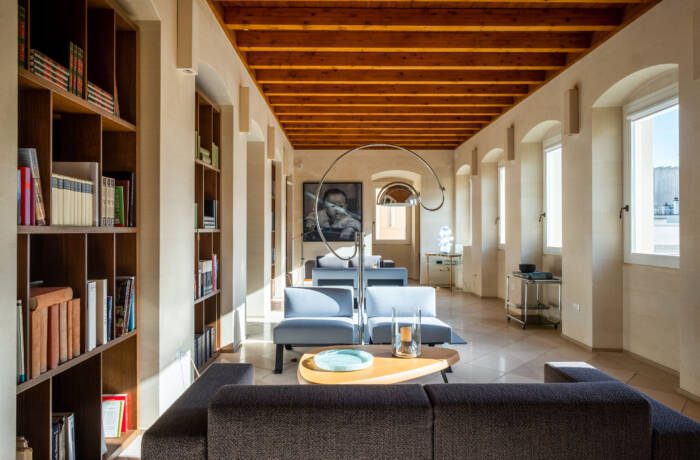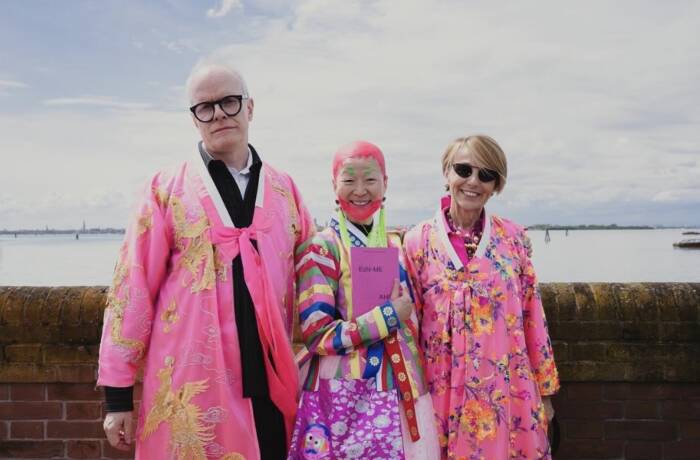
Brunello Cucinelli in his study
Brunello Cucinelli has built a multibillion-euro clothing empire out of nothing and revived an impoverished community in central Italy. The king of cashmere speaks with Darius Sanai about responsibility, humanitarian capitalism and learning from the Persian empire
Brunello Cucinelli cuts a suave figure with a sweep of silver-dark hair, sitting on a chair behind a large table. The initial view on the Zoom call is wide angle, taken from a camera across the room, a huge space with cathedral-like ceilings. This is his famous office, in the restored medieval village of Solomeo that is now home to his company.
Behind him as far as the eye can see are bookshelves. Not the pretentiously prearranged shelves of politicians preened to show where their interests lie, or the by-the-yard, untouched bookshelves of an oligarch. These are shelves from which the books have plainly been taken in and out, referred to constantly. Some books are standing up, others are at a diagonal, others on their side in piles next to gaps.
Follow LUX on Instagram: luxthemagazine
There seems to be a lot of history, philosophy, art and photography from what I can make out when the camera zooms in a bit closer to him. To his left, slightly incongruously, is a bowl of what look like basketballs.
Cucinelli is no ordinary Italian fashion magnate. He may be the founder of a family company with 7,000 employees and a turnover of €200m, but during the course of our 90-minute conversation and interview he barely once touched on the subject of the garment industry, merchandising or marketing.
The son of an impoverished factory worker, Cucinelli started his company in 1978, and is now synonymous with highly contemporary cashmere.
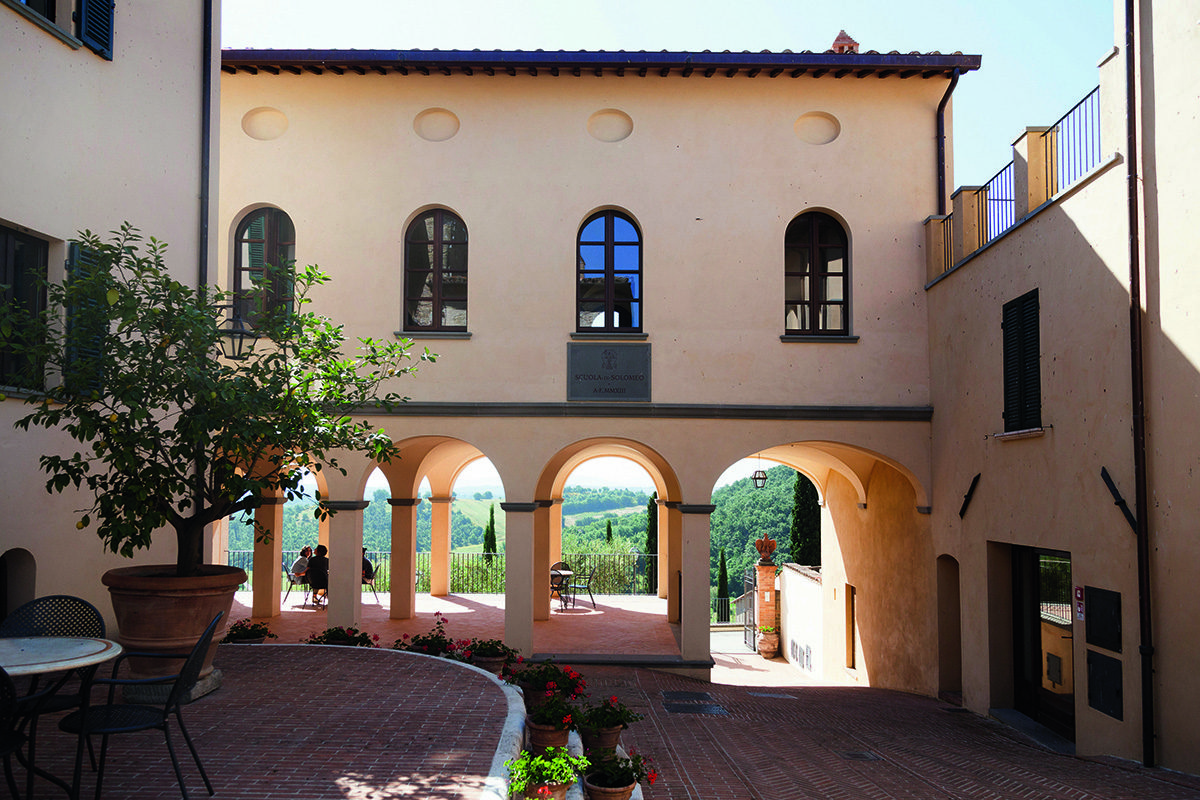
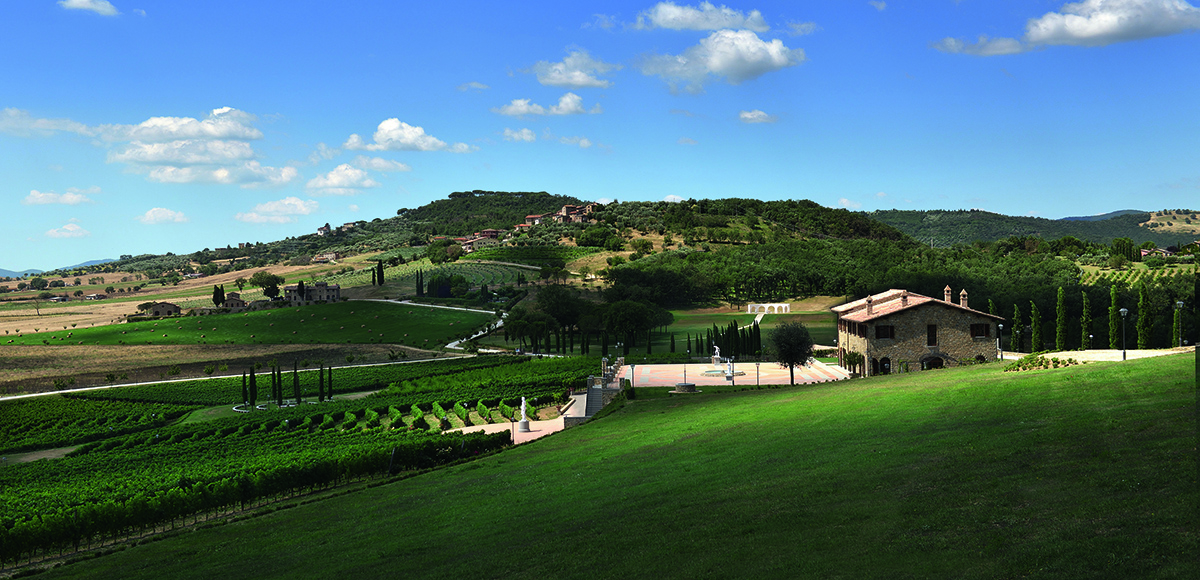
The Scuola dei Mestieri (top) and the valley below Solomeo (above)
He is also something else: an old-fashioned benevolent capitalist (he calls it “humanitarian capitalism”), driven by civic duty as much as profit, in the mould of the Cadburys and Heskeths of Victorian Britain who built housing, hospitals and churches for their workers.
He has used millions of his own funds to build his company’s headquarters and factory in what was the declining hamlet of Solomeo, south of Florence. He has built schools and a theatre, restored the 12th-century church, and revived the local wine and food artisans.
Read more: Artists in residence at Castel Caramel in the south of France
In our opening chat, he was more interested in engaging with me about my namesake Persian king and his relative, Cyrus the Great. This was no PR-manufactured pillow talk either – Cucinelli is an avid self-taught polymath in philosophy and history and his citations, darting between philosophers of different eras and cultures, were more than a match for this Oxford University-trained philosopher.
But in the era where the private sector’s role in and responsibility for people and the planet have never been more important, it was this fundamental aspect of his business, humanitarian capitalism, that we engaged on.
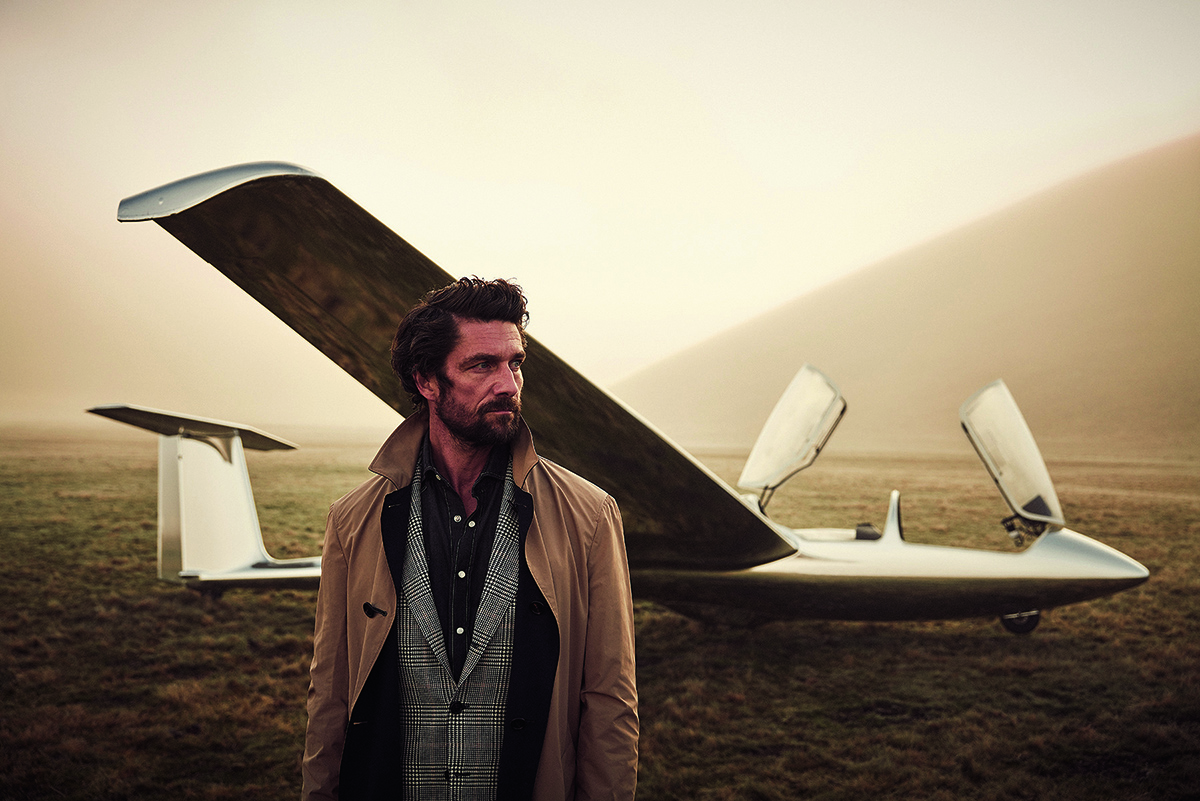
The spring 2021 menswear campaign was shot in the Sibillini Mountains in central Italy
LUX: Why did you choose cashmere for your business?
Brunello Cucinelli: I decided overnight to do cashmere. I didn’t know anything about this kind of material, but I knew one thing for sure – I wanted a product that you would never throw away but hand down to the next generation. I loved this idea of being able to act
as a guardian and of something you can reuse and hand down. It is a very contemporary idea, but I was there years ago. I wanted to work with cashmere, because it never gets thrown away. And I wanted to make a profit, but a fair one with a fair relationship to giving back. I wanted it to be made with ethics, dignity and respect for the moral code. And I didn’t want to bring harm to anything that was around me.
LUX: You began following these principles years ago and they are now common in corporate culture. What has changed?
Brunello Cucinelli: I have always wanted my employees to earn a bit more than the average, and for them to work in beautiful surroundings. I also decided they should work only for eight hours a day, the German way if you wish. I didn’t want them to be working online after work or at the weekends but to be extremely focused during the day. I wanted to achieve this balance so that you can have enough time for your mind, and then time to work, and I wanted to promote the idea of living in harmony with everything around you, with other people, with the land, with the water, with the air.
Read more: Speaking with America’s new art icon Rashid Johnson
LUX: How can a business find time to be both profitable and responsible, because many businesses would focus just on profit?
Brunello Cucinelli: To be credible, you must be truthful both when things are going well and not going well. Everybody knows about the profit that your company makes, and everybody must be put in a position to earn a fair amount. This is a responsibility towards other people, towards wildlife, towards the land. Here, we grow our grain, our olives, our wine; it all goes into the company canteen, but we don’t call this ‘organic produce’, we just say this is produce grown with respect to nature.
LUX: How does this philosophy add to the future of the company?
Brunello Cucinelli: I believe that young people will increasingly want to know where and how a product has been made, what harm if any has been caused during the production process. If they find out that a preposterous profit has been made out of something, they will decide not to buy a specific product. Profit must be balanced and fair, where every link in the chain each makes their own profit, from the shepherd with the goats to the investors and the bankers, to the workers, everybody. When I went public, I said to the potential investors that if you want a company that is making a fair profit and also helping the local community, then you can invest in my company. But if you are looking for a company that delivers fast growth, then this one is not for you.
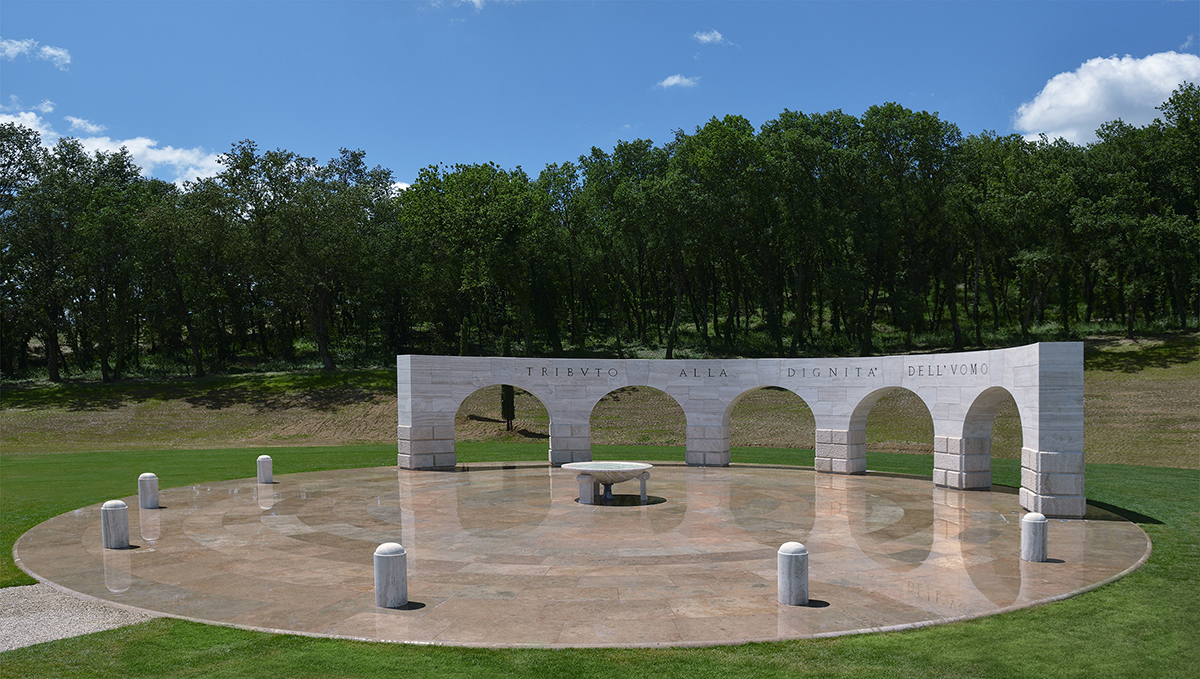
The monument ‘Tribute to Human Dignity’
LUX: Does your philosophy only apply to your company or could others learn from you?
Brunello Cucinelli: There are 7,000 people in the company, with 2,000 direct employees and 5,000 subcontractors or indirect people who work with us and we make a normal profit. Even in 2020, we only had a 10 per cent dip in our revenues and you still saw my workers going out of their way to design the best collections ever because probably it is precisely in a time of sorrows and pain that you release your creativity. It is definitely possible to make a profit and at the same time respect human dignity. Even in my own life, for example, I’ve always told the banks managing my assets that they need to invest them in companies that respect the human being.
Read more: The rise of millennial art collectors
LUX: What is the future of physical stores compared to online retail?
Brunello Cucinelli: E-commerce is extremely important for the brand image, but physical stores are just as important, if not more so. I want to go in a physical store, I want to be met by a caring salesperson who may ask after me and my family, and I want to see and touch things with my own eyes and hands. And especially after this pandemic, we are craving physicality. Jeff Bezos, who was here visiting, said that with Amazon he is not able to create emotions; he is basically just providing a service and when you receive your parcel at home, you own it, whereas when you go into a store you have this human exchange with the salesperson. They are both important worlds.
LUX: Would you have sold your company to the likes of François Pinault or Bernard Arnault if they had offered to buy it?
Brunello Cucinelli: We are majority shareholders of the company and I like very much the idea of this being a company with the family involved because this has always been my dream. Being public in the Italian way is different to the American idea – for us having a company is like nurturing your own child. I feel protected by the fact that we are a public company because this way you need to be able to listen to those who might give you advice, investors, analysts.
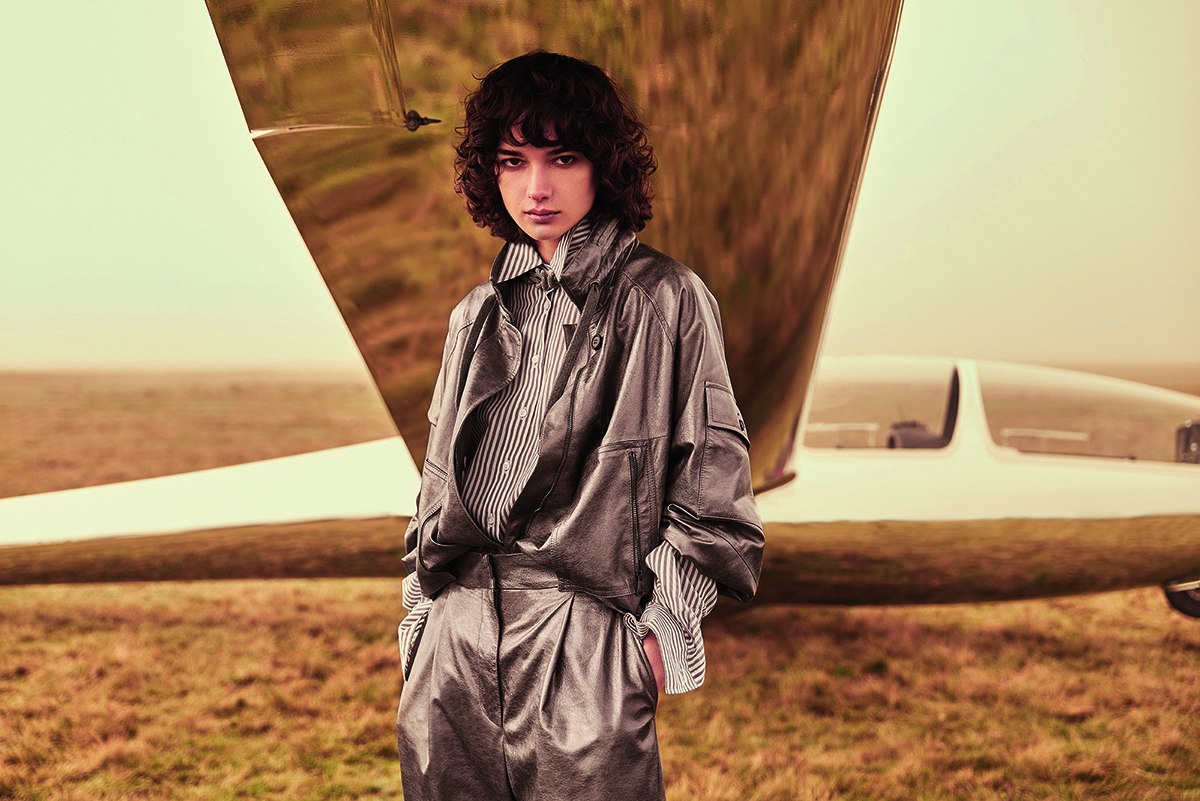
The spring 2021 womenswear campaign
LUX: With cashmere, what is more important, the design or the quality?
Brunello Cucinelli: Both. I have always wanted to procure the best quality material. Although I didn’t know anything at all about cashmere at the very beginning, I just went out there and said I want the best quality available. I’ve always tried to pursue quality and craftsmanship, first and foremost. It is something I never sacrifice and when you wear a garment that we have made I want you to know of all the people who have worked for it. But it must also be a very modern product because quality is not enough by itself. For example, when I was younger, I was looking at the UK because of the way they knitted their cashmere sweaters, but I wanted fresher colours, more pop colours. Taste is important as well as quality, otherwise you would not have a contemporary product.
LUX: What was your biggest challenge in all the time you have run your company?
Brunello Cucinelli: I would say March 2020, because overnight we had to make huge decisions such as not to lay off anybody, and to maintain everyone’s salaries. Nor did we ask for any discounts from our suppliers or landlords because this is not the way we behave, and especially in a pandemic. We also made sure that all the excess goods that were left in the store because of the closures were donated. My structure nowadays is even stronger than what it was a year ago because we were able to do everything sooner than expected. I have written to my employees, thanking them for what they have contributed to the company in this tough time, and tomorrow I’m meeting them in a video call just to thank them. It has been a very poignant time, one that has been hard both on our body and on our soul but at the same time, from the spiritual point of view, I would also call it one of the best times.
LUX: Our magazine works with a lot of artists. Do you work with many artists or support the arts around the world?
Brunello Cucinelli: I have always been surrounded by young, creative people and I have always liked them. The first thing I look for in a human being is their soul, as they must be kindred souls. I have always believed in a universal humanism regardless of race and religion. I’m a bit like Cyrus the Great, so to speak, and I am also convinced that if you show a human being esteem, regard and dignity, they will pay you back with great creativity.
Find out more: brunellocucinelli.com
This article was originally published in the Summer 2021 issue.


